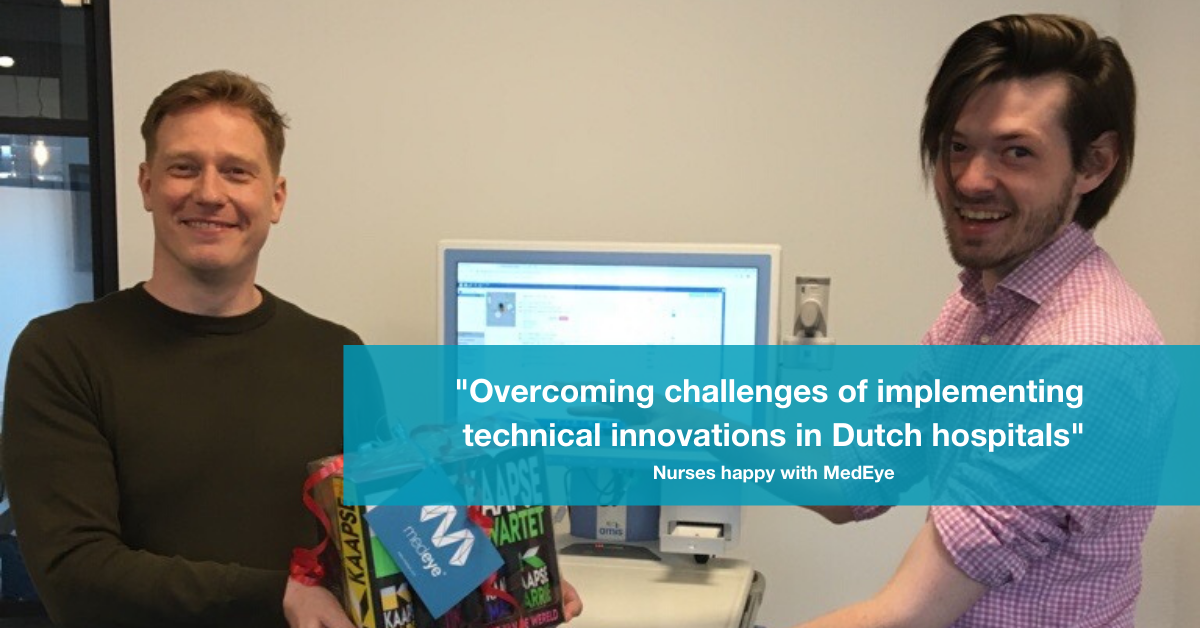Elderly care organization Present has taken major steps in increasing medication safety. They were one of the first to anticipate two major bottlenecks in elderly care: the double check of high-risk medication and the interim adjustment of the contents of the medication roll. By automating this with MedEye's medication safety system, they not only work more safely, but also more efficiently.
Heleen Griffioen, director at Present and responsible for, among other things, Care & Quality within the organization, thinks this innovation is very normal: “We want to provide safe care for our residents and that also includes medication safety. I don't see it as a competition, it is much more important that the medication process is done in a safe, efficient and easy way.” Quality nurse Niesje Donkersloot-van Rees agrees: “As a resident of Present you must be able to trust that the medication is provided, administered and registered correctly. The resident gives us this piece of trust, and we want to do this in the safest way possible. MedEye contributes to that safety.”
Double-check high-risk medications
One of the biggest bottlenecks in (elderly) care is the double check of high-risk medication, where a second person checks whether the correct medicine is given. This double check is sometimes difficult to implement, especially due to limited staffing. Within Present, MedEye takes over that second control where possible. This makes Present a leader in the Netherlands and not only does it work more safely, but it also saves valuable time for the caregiver/nurse. “It also provides ease of use for our colleagues, because always having a second colleague nearby for double checking is impossible,” says director Heleen Griffioen.
Fully automatic control of anticoagulants
An example is the fully automatic control of high-risk medications such as anticoagulants (anticoagulants such as acenocoumarol and phenprocoumon). By linking to the electronic prescription system Medimo, MedEye receives the correct information about which dosage should be given after the measured INR value. Because this can fluctuate, this medication is often not supplied in the medication roll, but is turned off manually. MedEye helps the nurse verify the correct medication and dosage by scanning the medication using AI (Artificial Intelligence). Quality nurse Donkersloot-van Rees is pleased that this no longer requires a second caregiver/nurse: “It is more efficient that the double check can be done by MedEye, because even with a double check by a second caregiver/nurse, errors could not always be prevented . So not only does it save time, but it is also more accurate.”
Adjusting medicine bags
Another bottleneck in elderly care is the interim adjustment of the medicine bags when the doctor's prescription changes. Some institutions choose to provide one bag per medication, but this does not improve sustainability and efficiency. Present works with so-called multi-dose medicine bags in which different medications are packed in one bag. “Previously, if a medication had to be placed in a multi-dose bag, we had to check it with two colleagues to ensure that we removed the correct tablet,” says quality nurse Donkersloot-van Rees. “Now we can only handle this with the support of the MedEye scanner, which is not only time-saving but also much safer. The MedEye scanner can accurately identify the correct medication that needs to be removed, and that gives confidence.”
Innovation and trust
In addition to medication safety and workload reduction, trusting an extra helper who will look over your shoulder is also important. “It is nice to work with a party that is accessible and thinks along with current work processes,” says Donkersloot-van Rees. “When we work with MedEye, it gives you self-confidence, you have the extra control from the systems you can rely on. You can also work more efficiently because we can scan the medicine bags and in many cases no longer have to have a double check carried out by a second colleague. It is great that Present has the opportunity to work with this, that innovations are being looked at.”







